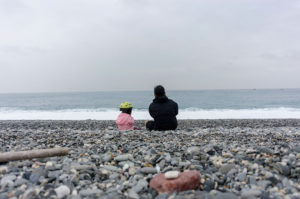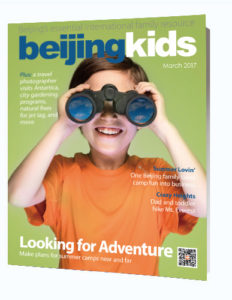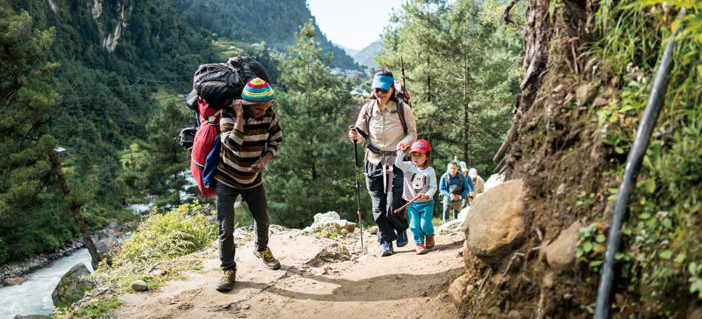On a sunny October day in 2016, a three-year-old began her ascent towards the top of Mt. Everest. Stefen Chow, father of “Little Chow,” as she is affectionately called, was the mastermind behind the adventure and hiked alongside his daughter and wife as the three of them made the journey towards the top of the mountain. After ten days, the trio had climbed 4,000 meters in the Himalayas, just below Mt. Everest’s South Base Camp (which stands at an altitude of 5,364 meters) before deciding to turn back, ensuring the perfect end to a beautiful and educational adventure.
While Chow does not simply ignore the fact that others would regard taking his daughter up Mt. Everest as a risky endeavor, he believed that Little Chow was up for the adventure. Chow researched and took careful medical precautions, packing emergency medical supplies as well as creating plans in case the family needed to be evacuated. “I did my research… if there was an emergency, helicopters could come and save us, there were doctors on the mountain,” he said.
“I knew the potential risks I was walking into, so I had all these contingency plans,” Chow added. Chow himself is also an experienced mountain climber, having scaled Mt. Everest with a team of five men eleven years ago, and thus is aware of symptoms of altitude sickness and other health issues that may arise when climbing.
Chow says that even though his daughter may not remember the trip, he is still happy that they went on the adventure together. Chow almost became a professional mountaineer after his first trip to Mt. Everest and said his “life is in the mountains.” His daughter gained such concrete knowledge during their trip, for example as how sherpas live in the mountains. Chow said what made the trip memorable was it gave him the opportunity to share this part of his life with his daughter.
 Father-Daughter Solo Trips
Father-Daughter Solo Trips
Chow’s trip with his daughter, when measured by most societal standards in the developed world, would be considered quite outrageous. He does not think that everyone must take their children on such extreme treks. Chow advocates for all parents to simply take one-on-one trips with their children. Chow recognizes that his thought process might be simply founded in stereotypes, but he particularly advocates that fathers take their children on what he calls “solo trips.” From his own personal experiences taking his daughter to Taiwan and Thailand, Chow believes these trips have allowed the two to form a deeper bond.
As a professional photographer, Chow spends a lot of time on the road. Since he has begun taking his daughter on trips, he believes her perception of him has changed. “I think, for my daughter, the father is a very fun person to have around so that part of the dynamic has changed. The mom has always been there, but since I travel now when I come back, Little Chow expects that I will do something with her at some point.”
Chow began taking his daughter on trips when he realized she was becoming more aware and conscious in her daily life. Instead of making simple, linear connections, Little Chow had begun to make lateral connections, finding relationships between seemingly unrelated events. Chow said an example of such a connection would be Little Chow making an association between a meal cooked at home and a meal eaten at a restaurant days later. Once he saw her making these associations, Chow thought his daughter was ready and would get more out of their trips together.
On these trips, Chow intentionally focuses on giving him and his daughter the opportunity to interact with local people and to try, for a short time, integrating into the local culture. He says that most of their time is spent walking in small towns and speaking to people rather than shopping and going to the typical tourist attractions. Little Chow is given as active a role as any three-year old can have during these trips. Chow says that during these excursions, as well as family adventures, he sees the two of them as partners rather than a strict parent-child pair. He also plans to take his son, now one and a half, on similar adventures when he can communicate similar connections.
Everyday Adventures
In the family’s daily life, Chow and his wife hope to guide their children and show them they have their own sense of agency as well. During weekend trips, the couple give their daughter (who is old enough to communicate verbally and coherently) choices between destinations. After Little Chow makes her choice, Chow and his wife will make arrangements to travel to that location. In a recent trip, the family chose between a trip to Weifang and Jinan, both in Shandong Province. Instead of Chow and his wife deciding, they gave their daughter the choice between the two cities. In the end, Little Chow chose Weifang due to intrigue over the city’s well-known kite flying, and so the family traveled to the city for the sole purpose of flying kites.
Chow attributes part of his parenting philosophy to experiences with his own father, a businessman in Singapore. As a child, his father would consciously bring him to business meetings in an effort to carve out quality father-son time. As a result, Chow witnessed business meetings that succeeded and failed, as well as the everyday life of his father outside of his parental role. These experiences allowed Chow to understand his father in a more holistic way.
Outside of traveling to different parts of China and the wider world, Chow and his wife also make an effort to take their kids with them when they go out with friends. Chow also says that he and his wife made a conscious decision to try and maintain their pre-parental lifestyle as much as possible. The family goes to kid-friendly locations and bars such as Great Leap Brewing. When asked how he and his wife balance being present with their friends while also looking after their children, Chow did not seem to think that it was an issue. Chow says that his children are well behaved and he attributes part of his children’s’ public behavior to having been exposed to many similar adult situations.

Chow hopes that his children will learn how to interact with different kinds of people through these daily and otherwise planned adventures. He also hopes above all to show his kids what his life is like outside of his parental role. “A lot of us parents today have a lot to offer our children, but if you can spend time with them and show them your world, I think the children will all benefit a lot.”
In allowing them to make decisions during their travels, taking them together to adult gatherings, and encouraging them to speak to different types of people, Chow hopes his kids can become independent thinkers. As for the next big adventure? Chow says the family is looking into a bike tour in Taiwan on Europe. Either way, the kids and the parents are sure to be present together.
All photos courtesy of Stefen Chow

This article originally appeared on p. 42-43 of beijingkids March Issue. Download a copy here.




